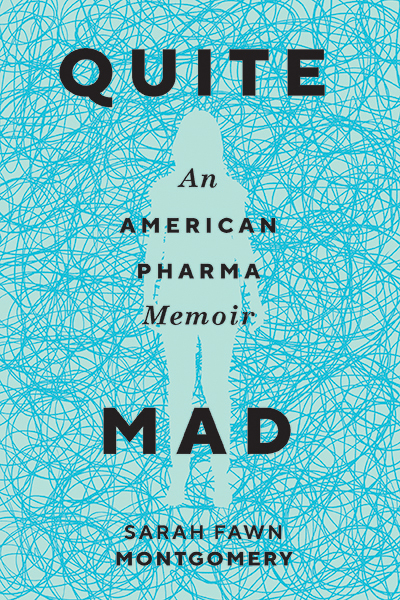“To cover so much material could have resulted in an unwieldy book, but Montgomery’s keen curiosity guides us through history, social criticism, and the author’s lived experience.…Quite Mad joins several recent works…which, thankfully, seem to be working toward new ways of writing about mental health.” —Melissa Oliveira, Brevity
“Interspersed with this personal story is a fascinating look at the history of mental illness, with its categories and cures, and the ways that each era creates its own notions of health and illness, along with its own cures.” —New Pages
“Quite Mad, Sarah Fawn Montgomery’s mental illness memoir, is nothing short of mesmerizing—an ode to her years of struggling with anxiety, OCD, and PTSD, all of which she eventually accepted as a core part of her being. . . . Nevertheless, the book contains quiet triumphs and self-discovery, shining with unyielding grace and humor. Montgomery’s writing is eloquent, making no attempt to mask her pain. She cites medical studies but also keeps things personal; the result is a stellar work of literary journalism.” —Foreword Reviews
“A wrenching account of a difficult upbringing and a chaotic brain that will leave readers marveling at the author's endurance. . . . The author offers a gripping picture of the real pain and suffering of someone diagnosed with chronic mental illness.” —Kirkus Reviews
“Quite Mad is at once a well-organized history of mental illness, especially with regard to women, an examination of the role of the illness narrative, and a fascinating memoir of a woman’s struggle.” —Intima
“Sarah Fawn Montgomery’s Quite Mad is a brilliant, kinetic story of living with anxiety disorder. She captures both her inner struggles and her outer ones, taking control of both herself and the clinicians who put patient needs last. An essential book.” —Susanne Paola Antonetta, author of A Mind Apart
“An important and incredible debut work of nonfiction, a powerful consideration of our collective thinking about mental health, and a heartfelt unflinching memoir of her own personal fight against misunderstanding and overmedication.” —Steven Church, author of I’m Just Getting to the Disturbing Part
Diagnosed with severe anxiety, PTSD, and OCD in her early twenties, Sarah Fawn Montgomery spent the next ten years seeking treatment and the language with which to describe the indescribable consequences of her mental illness. Faced with disbelief, intolerable side effects, and unexpected changes in her mental health as a result of treatment, Montgomery turned to American history and her own personal history—including her turbulent childhood and the violence she faced as a young woman—to make sense of the experience.
Blending memoir with literary journalism, Montgomery’s Quite Mad: An American Pharma Memoir examines America’s history of mental illness treatment—lobotomies to sterilization, the Rest Cure to Prozac—to challenge contemporary narratives about mental health. Questioning what it means to be a woman with highly stigmatized conditions, Montgomery also asks why mental illness continues to escalate in the United States despite so many “cures.” Investigating the construction of mental illness as a “female” malady, Montgomery exposes the ways current attitudes towards women and their bodies influence madness, as well as the ways madness has transformed to a chronic condition in our cultural imagination. Montgomery’s Quite Mad is one woman’s story, but it offers a beacon of hope and truth for the millions of individuals living with mental illness, and issues a warning about the danger of diagnosis and the complex definition of sanity.
Sarah Fawn Montgomery is the author of Regenerate: Poems of a Mad Woman, Leaving Tracks: A Prairie Guide, and The Astronaut Checks His Watch. She works as Prairie Schooner’s Assistant Editor and is an Assistant Professor at Bridgewater State University in Massachusetts.
Contents
Acknowledgments
Prologue
Part I
Chapter 1 The Influence of Intervention
Chapter 2 The Sick Role
Chapter 3 Nature or Nurture
Chapter 4 An American Diagnosis
Chapter 5 Patient History
Chapter 6 My Voice for Their Drugs
Part II
Chapter 7 A Female Malady
Chapter 8 Learned Behavior
Chapter 9 The World We’ve Made for Women
Chapter 10 Editing
Chapter 11 Molecular Myths
Part III
Chapter 12 Bitter Pills
Chapter 13 Rebuffed
Chapter 14 Delicates
Chapter 15 Unbearable Weight
Part IV
Chapter 16 Rapture in May
Chapter 17 Occam’s Razor
Chapter 18 Compulsion
Chapter 19 Moral Treatment
Chapter 20 Taking Up Space
Chapter 21 Turning Around
Chapter 22 Is Satisfied Enough?
Epilogue
Notes
References




